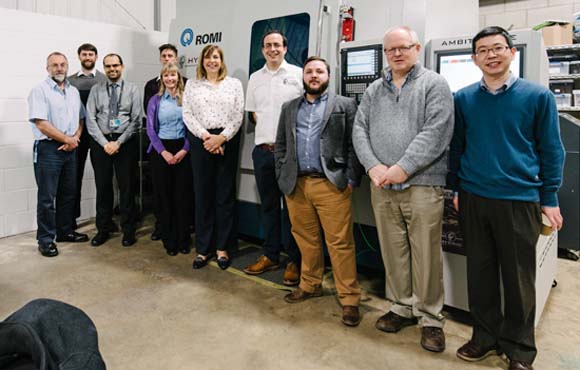CASCADE project seeks to establish advanced manufacturing supply chain in UK
April 30, 2018

The CASCADE team with a Romi “AMBIT”-enabled machine tool. (From left to right: Hugh Hamilton (Johnson Matthey), Tom Williamson (ASL), Usama Attia (MTC), Alex Selby (HMT), Kristina Parry (AMRC), Gill Thornton (LSS), Peter-Jon Solomon (HMT), James Ashby (LSS), Stuart Christie (Renishaw) and Xinjiang Hao (LSS) (Courtesy Liberty Speciality Steels)
The CASCADE project, supported by the UK Government’s Advanced Manufacturing Supply Chain Initiative (AMSCI), enters its third year focused on establishing an advanced manufacturing supply chain for Net Shape and Additive Manufactured (NSAM) parts which meets end-users’ requirements.
The project, led by Liberty Steel in Sheffield, UK, aims to bring together world-class expertise in metal powder atomisation, metallurgy, Net Shape and Additive Manufacturing. Its participants include industrial partners Johnson Matthey, Renishaw plc, Atomising Systems Ltd (ASL), Hybrid Manufacturing Technologies (HMT) and Farleygreene, as well as research and academic partners at the Manufacturing Technology Centre (MTC), Advanced Manufacturing Research Centre (AMRC), the University of Birmingham and the Warwick Manufacturing Group (WMG), University of Warwick via a subcontract.
Metal AM magazine spoke to Gill Thornton, Senior Project Manager at Liberty Speciality Steel (LSS), about some of the key topics under investigation in CASCADE, along with a selection of the project’s technical achievements to-date. “It is well-known that there is a huge potential for manufacturing using advanced powders,” she explained, “however the industrial application of many processes is being held back by some fundamental science and engineering challenges, where government funding of projects like CASCADE can help.”
Key topics under investigation by the project’s partners include particle size distribution and powder production yields – specifically, aiming to achieve full utilisation of powder batches by expanding existing powder size distribution specifications and supplying a range of markets, thereby reducing production costs and increasing industry uptake. CASCADE is also involved in designing next generation alloys for NSAM, through a combination of process modelling and alloy development, and in optimising the atomisation process for stainless steels and nickel super-alloys.
Through its industrial partners, the project also seeks to create what it calls the ‘next generation’ of Additive Manufacturing and hybrid AM systems. At formnext in November 2017, Renishaw debuted its RenAM 500Q multi-laser AM system, developed using CASCADE funding. Through CASCADE, next-generation hybrid AM blown powder deposition and deep inspection tool heads have also been developed at Hybrid Manufacturing Technologies.
CASCADE, using a state-of-the-art automated scanning electron microscope (SEM) system at WMG, is involved in the development and enhancement of a number of metal powder quality control concepts including; powder handling, in-line characterisation and the detection and understanding of the influence of contaminants and inclusions in metal powder. The Sievgen 04, an automated powder screening solution launched by Farleygreene in April 2017, was also developed in partnership with the project.
The project aims to develop a through process metallurgical understanding of quality parameters on end-user components – from raw material to finished parts. The partners are currently involved in the production of a number of Hot Isostatically Pressed (HIP), AM, Metal Injection Moulded (MIM) and hybrid AM demonstrator components, produced from fully characterised stainless steel and nickel super-alloy metal powders. These are to be sent for metallurgical and mechanical assessment across multiple partners for comparison against components made using traditional production methods.
One novel area under investigation by CASCADE is the use of platinum group metal dopants to enhance the corrosion resistance of net shape and additively manufactured components, led by Johnson Matthey. If successful, this could make it possible to extend the lifespan of NSAM components without the need for cladding or coating.
Central to the project is the establishment of a full Net Shape and Additive Manufacturing supply chain within the UK, with Liberty Steel proposing to acquire a vacuum atomisation system and a range of NSAM capabilities. In 2017, Liberty Speciality Steels (then Tata) reported that it had identified metal powder production as a key strategic future product range in the sectors of oil & gas, automotive, and aerospace, a view upheld by the new leadership team.
Under CASCADE, the company plans to establish a medium-term development programme to construct a large-scale atomising facility with annual production capacity of 400 tonnes per year, with a planned increase to 1200 tonnes annually. Liberty Steel believes that it has an advantage over most other potential vacuum powder suppliers, in that it is already experienced in the aerospace, automotive and nuclear supply chains, and the company stated that it will produce both powder and components depending on end-user requirements.
Liberty Steel shared that currently, vacuum atomised powders are produced mainly in the USA by Carpenter and Allegheny Technologies Inc (ATI) and in Japan by JFE Steel Corporation and Sanyo Special Steels. It was also stated that there are few vacuum atomisation facilities available to customers in Europe, aside from small facilities aimed at the production of powders in quantities suitable for fundamental research and development.
According to Liberty Steel, early stage discussions with a range of end-user partners within CASCADE suggest that if pilot scale facility is established prior to completion of CASCADE there is a high likelihood of commercial supply opportunities even in the short term.
“This project is moving fast with developing powder metals technology, and has already led to the creation of seventy-two new jobs across the CASCADE partners in the industry in England,” stated Gill Thornton. CASCADE is currently seeking further input from end users who would benefit from having a prototype demonstrator manufactured by the project partners.
Contact: [email protected]
















